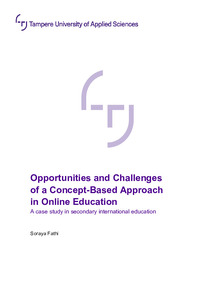Opportunities and challenges of a concept-based approach in online education : a case study in secondary international education
Fathi, Soraya (2024)
Fathi, Soraya
2024
All rights reserved. This publication is copyrighted. You may download, display and print it for Your own personal use. Commercial use is prohibited.
Julkaisun pysyvä osoite on
https://urn.fi/URN:NBN:fi:amk-202404298209
https://urn.fi/URN:NBN:fi:amk-202404298209
Tiivistelmä
Concept driven teaching emphasises the importance of focusing on conceptual understanding over rote memorisation, promoting critical thinking, problem-solving skills, and metacognition in students, challenging the traditional view of education as mere information delivery. Online education has been an object of study for decades, and research has been carried out on online education’s quality, theories, and models, with the COVID-19 pandemic causing a significant shift towards digital learning, leading to a lasting change in attitudes towards online education. This study investigated the feasibility of implementing a concept-driven approach in an online learning setting, utilising a case study methodology focused on an online educational institution delivering IB Diploma Programme courses. It aims at identifying both challenges and opportunities and to question to what extent the online courses developed by the institution promote the concept driven education embraced by the IB Diploma Programme.
This study adopted quantitative and qualitative research methods. The analysis was based on self-administrated surveys which were collected from 18 teachers. The survey contained a Likert-scale questionnaire, and a number of open-ended questions. Questions were organised in the following six thematic areas: Perceptions and beliefs on concept-based learning; concept-based learning in online teaching and learning; Concept-based learning in subject curriculum; Online teaching and learning strategies and resources; Online learning environment and the transition from facts, skills to concepts; and Conceptual understanding and assessment in an online learning environment. Research findings indicated a discrepancy between teachers' beliefs and everyday teaching practices. The Likert-scale responses highlighted an overall agreement with the advantages of a concept-based approach and with the success of the online course provider in promoting concept-based instruction. Nevertheless, open-ended comments revealed the adoption of more traditional practices among some educators. It was recommended that leadership should create more opportunities for teachers’ professional development, peer-sharing, and reflection so to support teachers in transitioning from traditional to concept-based teaching methods. This will improve the quality of concept-based teaching and learning at the institution, and so the alignment with the IB focus on fostering concept-based education.
This study adopted quantitative and qualitative research methods. The analysis was based on self-administrated surveys which were collected from 18 teachers. The survey contained a Likert-scale questionnaire, and a number of open-ended questions. Questions were organised in the following six thematic areas: Perceptions and beliefs on concept-based learning; concept-based learning in online teaching and learning; Concept-based learning in subject curriculum; Online teaching and learning strategies and resources; Online learning environment and the transition from facts, skills to concepts; and Conceptual understanding and assessment in an online learning environment. Research findings indicated a discrepancy between teachers' beliefs and everyday teaching practices. The Likert-scale responses highlighted an overall agreement with the advantages of a concept-based approach and with the success of the online course provider in promoting concept-based instruction. Nevertheless, open-ended comments revealed the adoption of more traditional practices among some educators. It was recommended that leadership should create more opportunities for teachers’ professional development, peer-sharing, and reflection so to support teachers in transitioning from traditional to concept-based teaching methods. This will improve the quality of concept-based teaching and learning at the institution, and so the alignment with the IB focus on fostering concept-based education.
